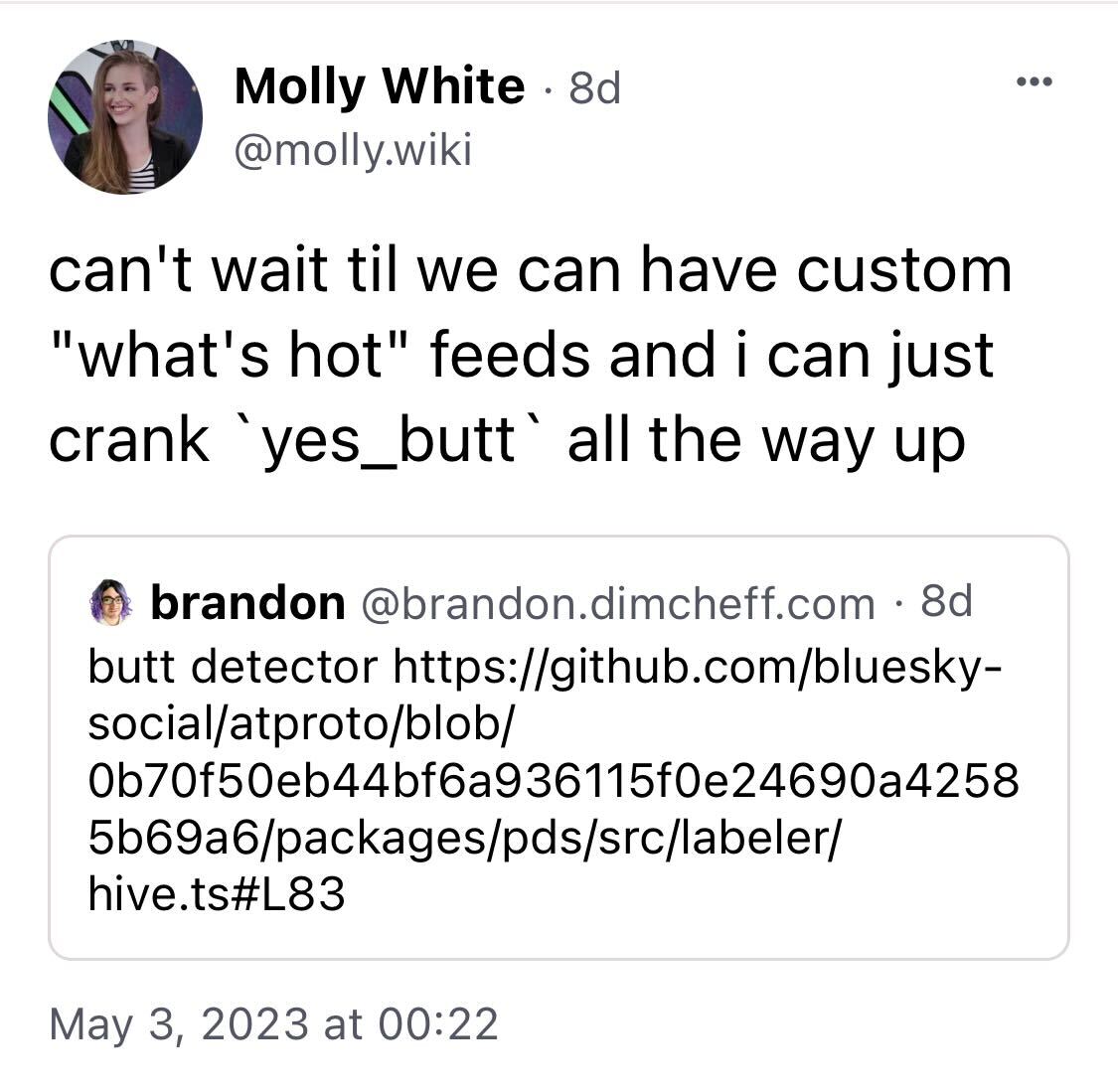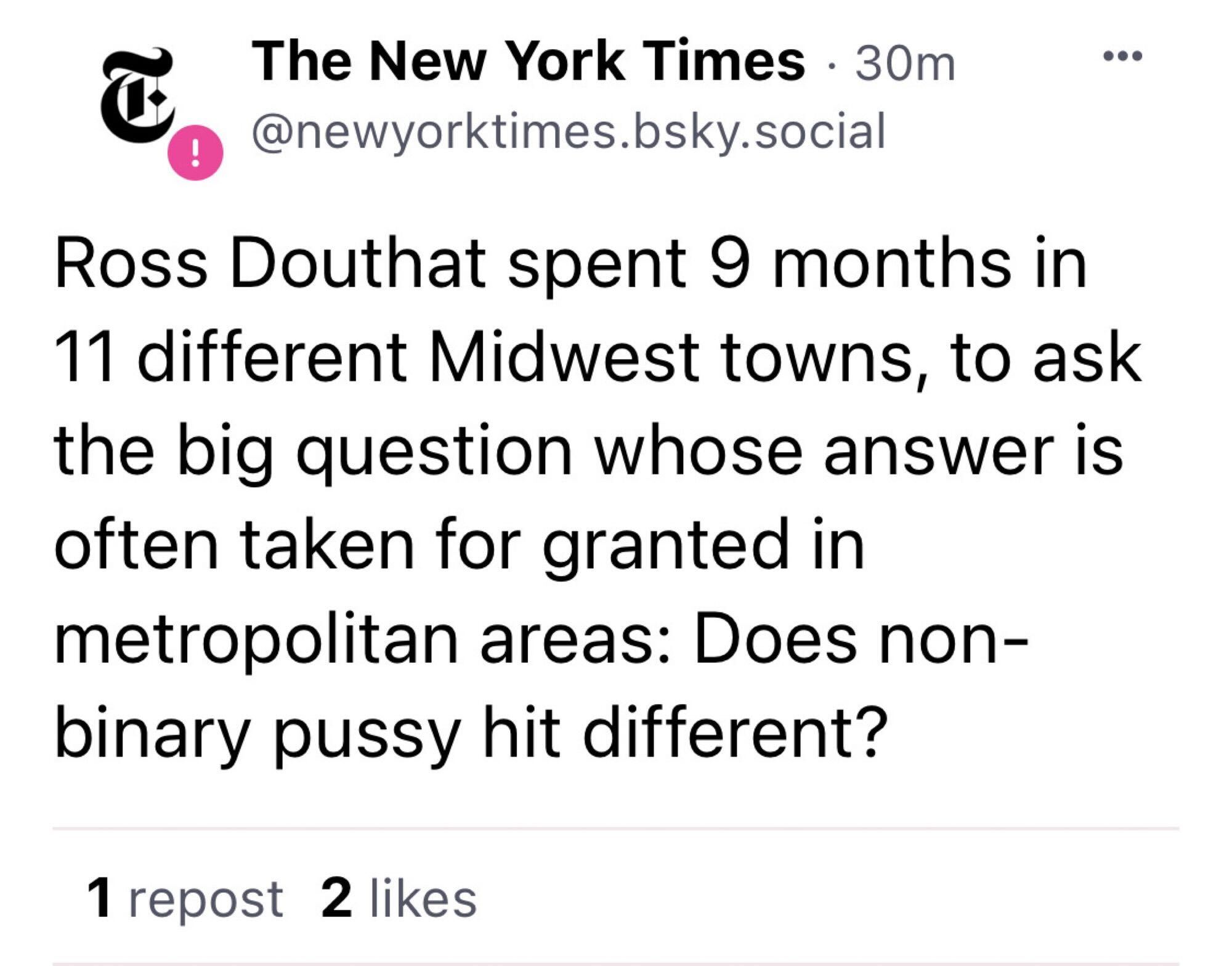By now you have almost certainly heard something about Bluesky, the microblogging app slash decentralized protocol that some are hailing as an inevitable replacement for the now virtually unusable, Elon Musk-infested hellscape of Twitter.
Bluesky is currently in invite-only beta, and populated mostly by expatriated Twitter power users who delight in having a new place to meet their friends and post—or “skeet,” as the platform’s short messages have been affectionately termed, much to the chagrin of Bluesky CEO Jay Graber. Only recently hitting 75,000 users, Bluesky in its current form is not for everyone—and that’s maybe its best feature. There is very little discourse, no sarcastic quote-dunking, and the few Nazis that do find their way over from the Other Place are quickly made unwelcome or muted into obscurity.
Videos by VICE
Instead, skeeters spend their days shitposting, sharing their interests, and hanging out with friends on the nascent social network—a throwback that some have compared to the early days of Twitter, or even community forums and bulletin boards. As someone who first got online during the age of BBS and Web 1.0, this has been fascinating to watch unfold. While Bluesky’s “small town” vibes will likely fade as the technology opens up to the general public, the past few weeks have been an exciting testament to the idea that maybe—just maybe—social networks shouldn’t include everyone by design.

The Cheers-esque nature of Bluesky is a bit of an anomaly these days, outside of places like web forums and some more obscure corners of Reddit. When I joined a month ago, it was mostly filled with tech bros and decentralization enthusiasts eagerly discussing the technology’s potential. Then, a few weeks ago, it actually started to get good. Invite codes were given out to some of Twitter’s most prolific trans shitposters, who were desperate to escape the rampantly escalating transphobia and genocidal rhetoric on Musk’s hellsite. They were followed by journalists, micro-celebs, and leftist politicians like Alexandria Ocasio-Cortez and Ilhan Omar, adding to the hype surrounding the invite-only “Twitter 2.0.” Like Twitter, Bluesky was founded by tech entrepreneur Jack Dorsey, who has been boosting the offshoot project as his former social platform continues to disintegrate under Musk.
The community is large enough that I could find plenty of mutuals and cool new accounts to follow, but small enough that there is a non-zero chance CNN’s Jake Tapper has seen a photo of my tits that I posted after reaching 420 followers. This is a feature, not a bug: The semi-curated userbase of unhinged but good-natured weirdos, general lack of serious discourse, and a firm dedication to good posting über alles is what makes the Bluesky experience—for now—extremely fun, in a way that hearkens back to earlier and smaller forms of online community.
This is virtually antithetical to Twitter, a global public forum where viral algorithms optimized to capture attention and engagement allow anyone to transcend their intended audience. I’ve argued before that this model of social media is completely unsustainable—the constant cycle of a new “main character” emerging on a near-daily basis is exhausting, even when the person in question is deserving of mockery. Moderation is also practically impossible on this global scale, and leaving a few companies responsible for it quickly veers into the realm of censorship and deeply unethical labor practices.
This brings us to perhaps the most important aspect of Bluesky and its aspirations for a decentralized social future: a focus on protocols instead of centralized enforcement and algorithmic curation.
In its current form, Bluesky is just one component of a decentralized protocol called AT. All this recent activity is unfolding on bsky.social, which is just one “instance” of the federated Bluesky social network. Eventually, the AT protocol will enable anyone to run their own Bluesky instance that operates independently but connects to all the others—similar to the older and less in-vogue Mastodon.
But what sets Bluesky apart from Mastodon is its promise of custom algorithmic feeds. Instead of choosing between an unfiltered raw feed and one “master algorithm,” Bluesky developers have detailed how they plan to support a kind of plug-and-play system for algorithms which lets users have more control over what appears as they scroll.

Currently, the Bluesky beta has just one algorithmic feed, called “What’s Hot,” which seems to boost skeets after they receive an arbitrary number of interactions. But this is just one test of how curation could work. In a blog post, Graber shared the company’s vision for a “marketplace of algorithms” where users select the types of filtering they want.
“For developers, an open marketplace of algorithms will provide the freedom to experiment with and publish algorithms that anyone can use,” she wrote. “Recent advances in machine learning will make it easy and exciting to experiment with new ways of structuring content.”
The technology is in its very early stages, but this opens up a number of possibilities that could potentially preserve the weird “small town” feel of Bluesky’s beta. For example, an instance could set its own rules such that its users’ posts won’t be visible on instances frequented by Nazis and other internet shitbirds. On top of that, custom algorithms could be designed that curate a user’s feed based on factors other than likes and engagement. This potentially avoids the pitfalls of doomscrolling and other forms of misery we suffer on places like Twitter and Facebook, whose algorithms seek to maximize the amount of time spent on the platform at any cost.

Since Bluesky is still relatively Nazi-free, some users have argued that Bluesky should set an example by banning racists, transphobes, and other internet ghouls on its bsky.social beta instance. Others complained when Graber announced last week that the What’s Hot feed would no longer surface any posts containing nudity. But depending on how the protocol develops, third-party instances and advanced algorithms could potentially make moderation less centralized by outsourcing the work to independent mods and interchangeable feeds. This means you could potentially make Bluesky feel more like a small community forum or subreddit, instead of a globe-spanning public square where algorithms show my posts to a horde of deranged goblins with bad opinions.
Of course, this is mostly speculation, and it’s far too early to say whether any of this will work. But if nothing else, the first few months of Bluesky have shown the promise of a return to small-scale internet communities—and a rejection of social media’s toxic status quo.




